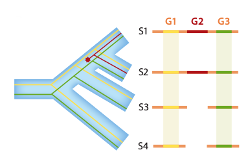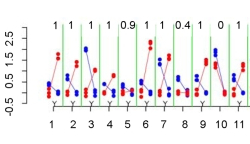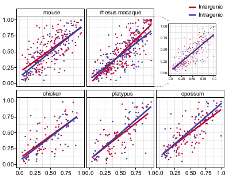Research
1) Spermatogenesis and the origin of new genes in Drosophila and in other species

To date, research on gametogenesis have focused primarily on self-study of fertility-related genes. However, genetic and evolutionary approach can be applied to gametogenesis process as a whole for understanding of evolutionary processes that take effect at the origin of the new genes and their role in the development process. The spermatogenesis generates a cell type, sperm, which has joint function in different organisms – the fertilization of the ovum. If the origin of new genes is directly related to adaptation and sperm functionality, new genes expressed in spermatogenesis must provide adaptive advantages as fertility, mobility, form and function of the male gametes. However, spermatogenesis is also a development system in which a series of DNA compaction and gene expression changes occur. Such processes may also influence in terms mutational the origin of new genes. Thus, the analysis of gene expression during spermatogenesis is presented as an ideal system to study and understand what are the evolutionary processes, whether or selective mutational who are directly involved in the origin and evolution of new genes.
2) Meiotic Sex Chromosome Inactivation in Drosophila

In several different taxa, there is indubitable evidence of transcriptional silencing of the X and Y chromosomes in male meiotic cells of spermatogenesis. However, the so called meiotic sex chromosome inactivation (MSCI) has been recently a hot bed for debate in Drosophila melanogaster. There are cytological and genetic observations, data from transgenic constructs with testis-specific promoters, global expression profiles obtained from mutant, wild-type, larvae and adult testes as well as from cells of different stages of spermatogenesis. There is no dispute on that D. melanogaster spermatogenesis presents a down-regulation of X chromosome that does not result from the lack of dosage compensation. However, the issue is currently focused on the level of reduction of X-linked expression, the precise time it occurs and how many genes are affected. The deep examination of data and experiments exposes the limitations intrinsic to the methods of studying MSCI in D. melanogaster. The current methods do not allow us to affirm anything else than the X chromosome down-regulation in meiosis (MSCI). Therefore, our group is implementing new approaches to investigate in detailed the process of MSCI for D. melanogaster model.
3) The genomic environment impact in non-coding RNA evolution

Genes are not randomly distributed throughout genomes. They are usually settled on particular contexts that provide the right environment to make them properly regulated in certain biological conditions and tissues. We use genomic context information, integrated with several gene features, to study how it does relate to evolutionary and functional properties of recently emerged and conserved non-coding RNAs.
Financial Support: